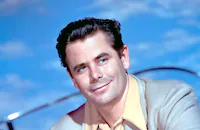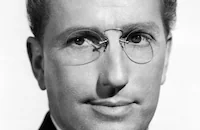The story has been filmed four times; twice for TV as Fearful Decision, the 1956 film version, and the 1996 remake starring Mel Gibson and directed by Ron Howard. It was first brought to the big screen by its broadcast director Alex Segal and writers Cyril Hume and Richard Maibaum with the addition of about an hour's worth of material and the marquee value of Ford and Reed. Neither was a major star, but both were longtime movie dependables who could be counted on to deliver believable, affecting performances.
Ford made an incredible 167 films in a 53-year career that began in 1939, often playing low-key, amiable but tough and introspective characters. The year before this film, he turned in two of his best performances in Trial and The Blackboard Jungle. After Ransom! he continued to demonstrate his range, proving himself equally at home in action films (Cimarron, 1960), comedies (Don't Go Near the Water, 1957) and dramas (Dear Heart, 1964). Although he remained a popular performer until his retirement early in the 1990s, he never received an Oscar, or even a nomination. Maybe it was because he made it seem so natural and effortless. Ford himself claimed he never played any character but himself, and once said, "When I'm on camera, I have to do things pretty much the way I do things in everyday life. It gives the audience someone real to identify with."
Reed had much this same quality, but by the time she paired with Ford on this film, she also had an Oscar under her belt a supporting actress award for the most uncharacteristic role of her career, the lovelorn prostitute in From Here to Eternity (1953). She was most often cast as the supportive wife and girl next door most famously in the perennial holiday favorite It's a Wonderful Life (1946). (It's almost a Hollywood rule: if you want an Academy Award, build a career on your wholesome appeal, then play a hooker. It worked for Shirley Jones in 1960's Elmer Gantry.) Despite strong performances in her Oscar-winning role and in Ransom!, Reed became increasingly frustrated with the "goody two-shoes" parts she was offered. Nevertheless, she parlayed that typecasting into great TV success on the Emmy-winning Donna Reed Show (1958 1966). But under her All-American suburban mom image, Reed was a feisty and outspoken woman, joining an organization opposed to the Vietnam War in the 1960s and frequently railing publicly against the sexism and small-mindedness of Hollywood.
The Ransom! cast also includes a couple of other notable actors. Juano Hernandez was one of the first of a new breed of black actors to emerge after World War II, not as a song-and-dance man or stereotypical comic relief but playing strong, often fiercely independent characters. He won his greatest acclaim in Intruder in the Dust (1949), from a story by William Faulkner about a proud man wrongfully accused of killing a white Southerner. Here he sensitively portrays the beleaguered family's understanding butler, shining in a scene where he must comfort Ford after everyone believes the plan has backfired and the boy has been killed.
This was the first film for Canadian-born Leslie Nielsen, who went on to play rugged leading man roles in such films as Forbidden Planet (1956) and Tammy and the Bachelor (1957) a far cry from the inspired buffoonery he displayed later in his career in Airplane! (1980) and The Naked Gun (1988).
Director: Alex Segal
Producer: Nicholas Nayfack
Screenplay: Cyril Hume, Richard Maibaum
Cinematography: Arthur E. Arling
Art Direction: Cedric Gibbons
Music: Jeff Alexander
Cast: Glenn Ford (David G. Stannard ), Donna Reed (Edith Stannard), Leslie Nielsen (Charlie Telfer), Juano Hernandez (Jesse Chapman), Robert Keith (Chief Jim Backett ) Bobby Clark (Andy Stannard).
BW-103m. Closed captioning.
by Rob Nixon



































